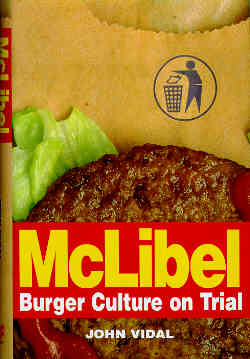
McDonald's serves writs as well as burgers and fries, finds Ross Clark
|
WHEN Ronald McDonald. the clown who is the mascot of the McDonald's hamburger empire, goes visiting local fêtes he turns up in a white Cadillac. addresses school children as 'my little fries", and gently suggests they all pop down to their local ham" burger bar for a bite to eat. The paternalism of such selling techniques was evidently too much to bear for the anarchists and environmental protesters who make up an organisation called London Greenpeace (which has nothing to do with the international movement of the same name). In 1985 they began distributing leaflets entitled "What's Wrong with McDonald's". which bore a number of reasonable complaints about the organisation, such as the litter found outside its restaurants, together with several debatable accusations, such as "McDonald's food is so lacking in bulk it is hardly possible to chew it". and a number of more fantastic allegations, such as that McDonald's was in the habit of torturing animals. McDonald's claimed the leaflets contained 35 libels. It identified five members of the group who had helped to distribute the leaflets and served them with writs for libel. Three apologised, but the other two, a barlady by the name of Helen Steel and an unemployed postman called Dave Morris, chose instead to defend themselves against the charges. If McDonald's was expecting a pushover, it was mistaken. Despite their lack of legal training, Steel and Morris managed to keep the American corporation's lawyers on the hoof for a record 313 days at the High Court; judgment is finally expected in June. Whichever way the judgment goes, it is difficult to see what McDonald's has gained by taking on the two anarchists: as well as spending an estimated £10 million on the case without any hope of obtaining much in the way of damages from its virtually penniless adversaries, the hamburger chain seems merely to have ensured that the contents of a little pamphlet which otherwise would have been read by a few hundred people have now been repeated around the world. One yearns for a dispassionate guide to lead the way through the legal quagmire. But, in spite of his assurances to the contrary, John Vidal has a natural affinity with the politics of Steel and Morris, the book being liberally spattered with appeals to the reader to see in McDonald's the evils of capitalism as a whole. In his central argument - that McDonald's has been over-zealous in protecting its image through the law courts - Vidal has a point: the corporation is also on record for threatening a Scottish sandwich-bar owner who has dared to use the prefix "Mc" in her trading name. But it is unfair of Vidal not to mention that McDonald's has itself been a victim of opportunistic legal action taken by its customers: it was ordered to pay hefty, punitive damages an American woman who scalded herself while trying to drive away from one of branches with a cup of steaming hot coffee sandwiched between her thighs. McDonald's emerges from this book as an unlovable organisation so dedicated to standardisation that its workers are instructed measure onion portions to the nearest quarter-ounce, while marketing executives have such a cynical view of food that they are capable of sending each other memorandums, saying "we don't sell nutrition and people don't come to McDonald's for nutrition" But there is something missing from this portrayal of McDonald's as an evil empire intent on ruining our diets and subverting local cultures: if McDonald's realy is as bad as Vidal make it out to be, can't even just a little bit of the blame for international it's success - $30 billion in sales in 1992, for example be placed on the shoulders of the multitudes foolish enough to be seduced by Ronald McDonald? |
